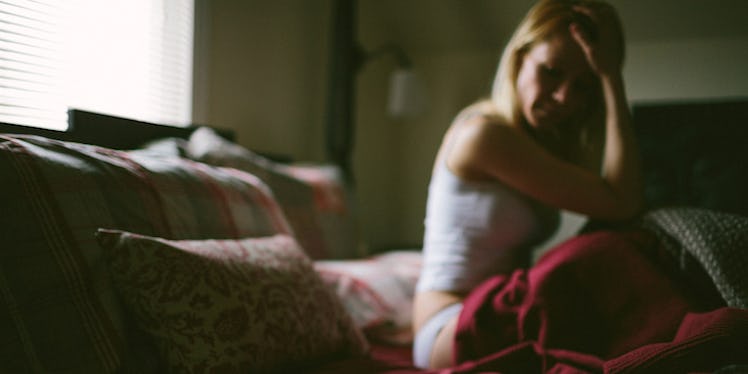There's a huge misconception that knocking back a couple of drinks before bed can help improve your sleep quality.
News flash: it doesn't.
Drinking before bed can simply make you fall asleep more quickly, but that's about all it helps with.
Once you're asleep, the alcohol totally messes with the stages of your sleep cycle throughout the night.
Here are five ways drinking alcohol before bed can disrupt your much-needed beauty rest.
1. It Decreases Rapid Eye Movement (REM Sleep)
With alcohol in your system, yes, you fall asleep quickly. And yes, you fall asleep deeply.
But you do not experience much rapid eye movement, the most important part of your sleep cycle, which means you're simply not sleeping as well.
Put the drink down if you really want true, restful shut-eye.
2. When You Wake Up, You'll Be Tired All Day
The less REM sleep you get, the more daytime drowsiness and poor concentration you'll struggle with.
After all, REM sleep is what allows you to dream. The brain's oxygen level is very high during this time -- even higher than when you're awake during the day.
This essentially means, if you drink before bed, you aren't getting as much oxygen to your brain.
I don't know about you, but that alone sounds scary as hell. Why would you want to do that?
3. Your Ability To Do Complex Tasks The Next Day Will Be Inhibited
Honestly, everything goes back to REM sleep. That's how important it is.
Proper REM sleep allows you the ability to function throughout the day, because it restores your mental processing.
This is when your brain undergoes the most renewal. With that said, because drinking before bed decreases your amount of REM sleep, you're actually inhibiting your ability to perform complex tasks the next day.
One sip of that alcohol too close to bedtime and you're basically screwing yourself over for the entire next day.
4. It Suppresses Breathing
Dude, alcohol before bed stifles you in more ways than one.
Not only does that nightcap affect your brain, it affects your lungs, too.
Alcohol tends to induce sleep apnea, which means you consistently pause in between breaths throughout the night.
Essentially, your lungs aren't receiving their full capacity of air.
One to two drinks won't hurt you, but the more you drink before bed, the more intense the disruption.
5. You Might End Up Sleepwalking
Sleep specialist Michael Breus, PhD, told WebMD that, “if you rely on alcohol to fall asleep, recognize that you have a greater likelihood to sleepwalk, sleep talk, and have problems with your memory."
With alcohol in your system, for the brief time you're in REM sleep, your dreams and nightmares are likely to be way more vivid, and you have a higher probability of walking around and acting them out.
